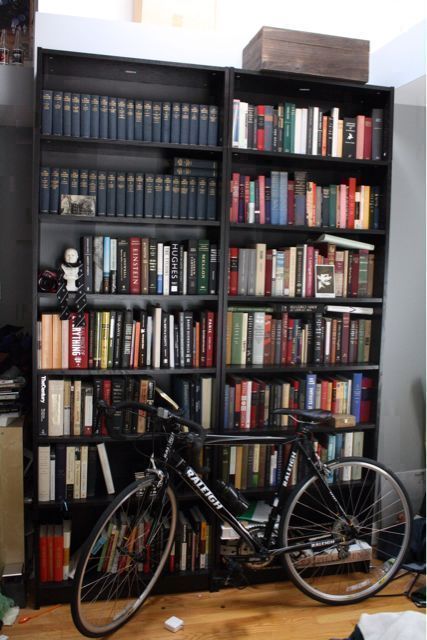I judge people based on their bookcases. Because I’m moving into student housing this academic year, I’ve had the unique pleasure of hauling a couple hundred books from my apartment to my home in the Chicago suburbs in the heat of late June and carrying them up to my room a month later.
They (i.e. the books) resided in temporary storage in my downstairs, where, on the floor, the bottom books of a half dozen stacks were damaged in the floods that afflicted the Chicago area last month. Lost were several marginal volumes of the Harvard Classics (e.g. Elizabethan Drama, et al.) and some fiction which I’d’ve gotten rid of eventually. What pained me most was the loss of a couple of John Updike anthologies, the massive tomes of bound book reviews, essays, articles, and self-referential flotsam and jetsam that A. A. Knopf released over the course of John’s prodigious writing career.
Sadly, I spent an evening meticulously separating pages from their spines and boards so that they (the pages and non-cloth-bound boards) may be recycled. It was a rather pitiful, sentimental experience. It was at this moment that I remembered that financial loss was limited to under one hundred fifty dollars, and that I could make an adventure of replacing three treasured volumes that are, alas, out of print. I have several reliable sources that tell me that Paris and London, where I’m headed in September, have exceptional used book stores; I’m a prodigal bibliomane, and something tells me I’ll be spending a lot of time in labyrinthine mazes of bookcases searching for a British first edition of Evelyn Waugh’s Vile Bodies, among others.
The process of expiating my room of clutter yielded books and magazines I believed to be lost. Although I am an aggregator of bound printed matter, I’ve resigned myself to failure in certain respects. I came across a small stack (20 issues) of New Yorker magazines from 2005-7 (yes, I was already a somewhat jaded reader of the New Yorker when was fifteen). I read through the cartoons and James Surowiecki’s financial/economic commentary. There was hope in his pieces, and a strange feeling arose in me after reading a 2005 article that painted credit default swaps as the best thing to hit Wall Street since securitization of equity shares of companies into tradable “shares” of “stock.”
I realized then, after reading this article, that there are some ideas that, like credit default swaps and saving New Yorkers for future reading, seemed like great ideas at the time but are ultimately indefensible lost causes. It was a goal of mine to lean out my book collection such that it fit onto two eight-foot high shelves. I came close.
What isn’t pictured in these photos are another eighty or so softcover nonfiction books, my high school yearbooks, and a large box of letters sent to me over the years. I’ll pick through it all, and the people who rummage through books left for the taking outside of Powell’s on 57th Street will find their book collections richer for my efforts.



Leave a Reply